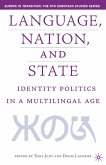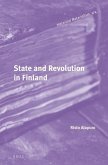Why and when do linguistic cleavages within a nation become politicized? Using Norway -- where language has played a particularly salient role in the nation's history -- as a case study, Gregg Bucken-Knapp explores these questions and challenges the notion that the politicization of language conflict is a response to language problems. He shows that political elites often view language conflict as a political opportunity, placing it on the policy agenda as an effective mobilizing tool to serve their own nonlinguistic political ends. Although language-oriented interest groups may fight to achieve desired language policies, they are generally unsuccessful when their preferences clash with the broader objectives of political elites. This book focuses on understanding just how language policies emerge.
Hinweis: Dieser Artikel kann nur an eine deutsche Lieferadresse ausgeliefert werden.
Hinweis: Dieser Artikel kann nur an eine deutsche Lieferadresse ausgeliefert werden.








